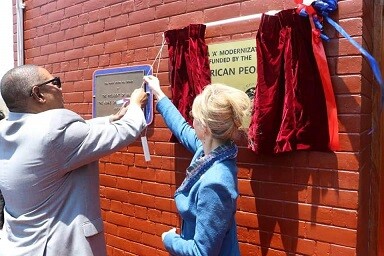
President Peter Mutharika says the construction of three power substations has given Malawi the facilities to export power to its neighbours.
The Malawi leader said on Wednesday that the country is developing capacity to distribute local power and import from outside as well as to export power to neighbouring countries.

He was speaking during the handover ceremony of the Millennium Challenge Account – First Compact and the commissioning of the Nkula A hydropower which has been upgraded under the of $350 million energy compact.
Mutharika noted that the Malawi Compact project has given Malawi the capacity to do more in resolving the power shortage problem.
He said the construction of three key substations at Phombeya, Nkhoma and Bwengu has provided Malawi with facilities to import and export power to neighbouring countries through the Southern African Power Pool.
“We are interconnecting with Mozambique using Phombeya Substation. We are interconnecting with Zambia using Nkhoma Substation. And we want to interconnect with Tanzania using Bwengu Substation.
“Not only are we developing capacity to distribute local power and import from outside, but we can also export power to neighbouring countries.
“At the same time, our modernised power distribution network will reduce electricity losses. It will also improve reliability and quality of electricity supply to Malawians,” Mutharika said.
He added that Malawi has now improved its transmission capacity and is ready to expand its energy generation to transmit enough electricity to the people and their businesses.
“Now we are ready to end electricity shortage. I want us to say farewell to blackouts. And we will say farewell to blackouts. I can guarantee you that.
“We will continue to pursue medium term and long-term measures to end energy once and for all. Because big energy projects take time, we are implementing several projects that will add at least 80 (eighty) megawatts by March 2019,” Mutharika said.
The president however decried Malawi’s dependency on hydro-power saying it is not sustainable since the climate is changing and the water in Lake Malawi is never always sufficient to generate enough power for Malawians.
He said the country is now diversifying into coal, gas, wind and solar power generation.
Millenium Challenge Compact Vice president Jean Hauch commended government for the successful completion of the compact.
She said it was noted from the start that, to improve the availability, reliability, and quality of the nation’s power supply a lot, including policy and institutional reforms as well as efforts to protect the rivers that drive power generation here in Malawi.
“In the energy sector, no one investment alone can drive growth and sustainable change. It was vital to make connections between the three compact projects, to link the Infrastructure Development, the Power Sector Reform, and the Environmental & Natural Resource Management elements. Taken together, these components are much more than the sum of their parts. The synergy of the work achieved through these projects is generating a brighter future for Malawi,” she said.














